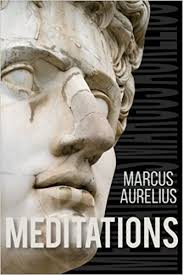Meditations Page #25
Meditations is a series of personal writings by Marcus Aurelius, Roman Emperor from 161 to 180 AD, recording his private notes to himself and ideas on Stoic philosophy. Marcus Aurelius wrote the 12 books of the Meditations in Koine Greek as a source for his own guidance and self-improvement.
XLII. Let the several deaths of men of all sorts, and of all sorts of professions, and of all sort of nations, be a perpetual object of thy thoughts,... so that thou mayst even come down to Philistio, Phoebus, and Origanion. Pass now to other generations. Thither shall we after many changes, where so many brave orators are; where so many grave philosophers; Heraclitus, Pythagoras, Socrates. Where so many heroes of the old times; and then so many brave captains of the latter times; and so many kings. After all these, where Eudoxus, Hipparchus, Archimedes; where so many other sharp, generous, industrious, subtile, peremptory dispositions; and among others, even they, that have been the greatest scoffers and deriders of the frailty and brevity of this our human life; as Menippus, and others, as many as there have been such as he. Of all these consider, that they long since are all dead, and gone. And what do they suffer by it! Nay they that have not so much as a name remaining, what are they the worse for it? One thing there is, and that only, which is worth our while in this world, and ought by us much to be esteemed; and that is, according to truth and righteousness, meekly and lovingly to converse with false, and unrighteous men. XLIII. When thou wilt comfort and cheer thyself, call to mind the several gifts and virtues of them, whom thou dost daily converse with; as for example, the industry of the one; the modesty of another; the liberality of a third; of another some other thing. For nothing can so much rejoice thee, as the resemblances and parallels of several virtues, visible and eminent in the dispositions of those who live with thee; especially when, all at once, as near as may be, they represent themselves unto thee. And therefore thou must have them always in a readiness. XLIV. Dost thou grieve that thou dost weigh but so many pounds, and not three hundred rather? Just as much reason hast thou to grieve that thou must live but so many years, and not longer. For as for bulk and substance thou dost content thyself with that proportion of it that is allotted unto thee, so shouldst thou for time. XLV. Let us do our best endeavours to persuade them; but however, if reason and justice lead thee to it, do it, though they be never so much against it. But if any shall by force withstand thee, and hinder thee in it, convert thy virtuous inclination from one object unto another, from justice to contented equanimity, and cheerful patience: so that what in the one is thy hindrance, thou mayst make use of it for the exercise of another virtue: and remember that it was with due exception, and reservation, that thou didst at first incline and desire. For thou didst not set thy mind upon things impossible. Upon what then? that all thy desires might ever be moderated with this due kind of reservation. And this thou hast, and mayst always obtain, whether the thing desired be in thy power or no. And what do I care for more, if that for which I was born and brought forth into the world (to rule all my desires with reason and discretion) may be? XLVI. The ambitious supposeth another man's act, praise and applause, to be his own happiness; the voluptuous his own sense and feeling; but he that is wise, his own action. XLVII. It is in thy power absolutely to exclude all manner of conceit and opinion, as concerning this matter; and by the same means, to exclude all grief and sorrow from thy soul. For as for the things and objects themselves, they of themselves have no such power, whereby to beget and force upon us any opinion at all. XLVIII. Use thyself when any man speaks unto thee, so to hearken unto him, as that in the interim thou give not way to any other thoughts; that so thou mayst (as far as is possible) seem fixed and fastened to his very soul, whosoever he be that speaks unto thee. XLIX. That which is not good for the bee-hive, cannot be good for the bee. L. Will either passengers, or patients, find fault and complain, either the one if they be well carried, or the others if well cured? Do they take care for any more than this; the one, that their shipmaster may bring them safe to land, and the other, that their physician may effect their recovery? LI. How many of them who came into the world at the same time when I did, are already gone out of it? LII. To them that are sick of the jaundice, honey seems bitter; and to them that are bitten by a mad dog, the water terrible; and to children, a little ball seems a fine thing. And why then should I be angry? or do I think that error and false opinion is less powerful to make men transgress, than either choler, being immoderate and excessive, to cause the jaundice; or poison, to cause rage? LIII. No man can hinder thee to live as thy nature doth require. Nothing can happen unto thee, but what the common good of nature doth require. LIV. What manner of men they be whom they seek to please, and what to get, and by what actions: how soon time will cover and bury all things, and how many it hath already buried! THE SEVENTH BOOK I. What is wickedness? It is that which many time and often thou hast already seen and known in the world. And so oft as anything doth happen that might otherwise trouble thee, let this memento presently come to thy mind, that it is that which thou hast already often Seen and known. Generally, above and below, thou shalt find but the same things. The very same things whereof ancient stories, middle age stories, and fresh stories are full whereof towns are full, and houses full. There is nothing that is new. All things that are, are both usual and of little continuance. II. What fear is there that thy dogmata, or philosophical resolutions and conclusions, should become dead in thee, and lose their proper power and efficacy to make thee live happy, as long as those proper and correlative fancies, and representations of things on which they mutually depend (which continually to stir up and revive is in thy power,) are still kept fresh and alive? It is in my power concerning this thing that is happened, what soever it be, to conceit that which is right and true. If it be, why then am I troubled? Those things that are without my understanding, are nothing to it at all: and that is it only, which doth properly concern me. Be always in this mind, and thou wilt be right. III. That which most men would think themselves most happy for, and would prefer before all things, if the Gods would grant it unto them after their deaths, thou mayst whilst thou livest grant unto thyself; to live again. See the things of the world again, as thou hast already seen them. For what is it else to live again? Public shows and solemnities with much pomp and vanity, stage plays, flocks and herds; conflicts and contentions: a bone thrown to a company of hungry curs; a bait for greedy fishes; the painfulness, and continual burden-bearing of wretched ants, the running to and fro of terrified mice: little puppets drawn up and down with wires and nerves: these be the objects of the world among all these thou must stand steadfast, meekly affected, and free from all manner of indignation; with this right ratiocination and apprehension; that as the worth is of those things which a man doth affect, so is in very deed every man's worth more or less.
Translation
Translate and read this book in other languages:
Select another language:
- - Select -
- 简体中文 (Chinese - Simplified)
- 繁體中文 (Chinese - Traditional)
- Español (Spanish)
- Esperanto (Esperanto)
- 日本語 (Japanese)
- Português (Portuguese)
- Deutsch (German)
- العربية (Arabic)
- Français (French)
- Русский (Russian)
- ಕನ್ನಡ (Kannada)
- 한국어 (Korean)
- עברית (Hebrew)
- Gaeilge (Irish)
- Українська (Ukrainian)
- اردو (Urdu)
- Magyar (Hungarian)
- मानक हिन्दी (Hindi)
- Indonesia (Indonesian)
- Italiano (Italian)
- தமிழ் (Tamil)
- Türkçe (Turkish)
- తెలుగు (Telugu)
- ภาษาไทย (Thai)
- Tiếng Việt (Vietnamese)
- Čeština (Czech)
- Polski (Polish)
- Bahasa Indonesia (Indonesian)
- Românește (Romanian)
- Nederlands (Dutch)
- Ελληνικά (Greek)
- Latinum (Latin)
- Svenska (Swedish)
- Dansk (Danish)
- Suomi (Finnish)
- فارسی (Persian)
- ייִדיש (Yiddish)
- հայերեն (Armenian)
- Norsk (Norwegian)
- English (English)
Citation
Use the citation below to add this book to your bibliography:
Style:MLAChicagoAPA
"Meditations Books." Literature.com. STANDS4 LLC, 2025. Web. 26 Feb. 2025. <https://www.literature.com/book/meditations_76>.








Discuss this Meditations book with the community:
Report Comment
We're doing our best to make sure our content is useful, accurate and safe.
If by any chance you spot an inappropriate comment while navigating through our website please use this form to let us know, and we'll take care of it shortly.
Attachment
You need to be logged in to favorite.
Log In